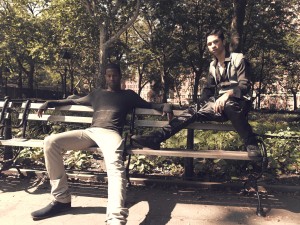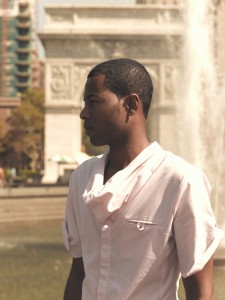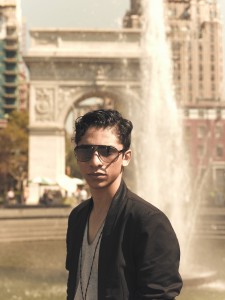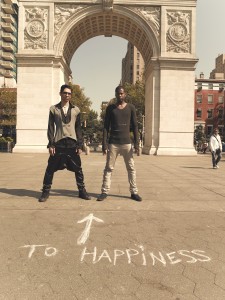TWO YOUNG, MATURE ACTORS: RICKEY CASTLEBERRY AND ANDREW DAVIS
By Eveline Morel | October 8th, 2012 | Category: Interviews | Comments Off on TWO YOUNG, MATURE ACTORS: RICKEY CASTLEBERRY AND ANDREW DAVIS Rickey Castleberry’s and Andrew Davis’s resumes are impressive for any age, particularly a 20-year-old. Currently working on a new mystery drama TV series entitled “Life as We Know It,” not just as actors, but as writers and producers, they just got back from New York, where they attended red-carpet fashion events and are signing with one of the top production companies for their upcoming TV series.
Rickey Castleberry’s and Andrew Davis’s resumes are impressive for any age, particularly a 20-year-old. Currently working on a new mystery drama TV series entitled “Life as We Know It,” not just as actors, but as writers and producers, they just got back from New York, where they attended red-carpet fashion events and are signing with one of the top production companies for their upcoming TV series.
Dru, 19 years old, has played in “Wizards of Waverly Place,” has a recurring role in Fox’s “I Hate My Teenage Daughter,” and is also working on his music career, getting ready to sign with a major label. Rickey, 23, with a recurring role on “Pretty Little Liars,” is producing a web series, and now writing and producing his TV series with Dru. Talking with them, I am struck by their overall maturity level and positive outlook—most definitely, not your typical 20-year-old “Hollywood” types.
So how did you two start acting? When did you know you wanted to be actors?
D: I actually started singing first, and I fell in love with acting through music, around 12 or 13. My godmother had started a management company, and I was her first client, so she guided me . . . and is still guiding me. She was president of Disney Channel. She said I needed to do all three: dancing, singing, and acting. I already was in love with music, and I found a deeper understanding for life after I started acting. It opened up a whole new world.
R: I was going to college in Texas, studying to be an anesthesiologist when I started acting. While in college, I started receiving more casting notices, which was really interesting, because a lot of the casting work was from here. At that time I didn’t have any representation in the L.A. market, so this was like fate.
 So you went to school to be an anesthesiologist, and you realized it was not your passion, so you just stopped going to college?
So you went to school to be an anesthesiologist, and you realized it was not your passion, so you just stopped going to college?
R: I got to this crossroads where I had to decide whether or not I’m going to do what I like or do what I love. The fantasy of a child and seeing myself being a doctor was great, but I’d be making a living putting people to sleep. I wanted to do what I love. So that’s when I felt that coming to Los Angeles was the right thing. And I’ve been here ever since. I’m not going to say there hasn’t been a day where I had less than enough money in my bank account to do what I wanted. The other day I had to go to Taco Bell and get a 3-dollar beef burrito and eat that for dinner. And that’s the nature of the beast . . . builds character. It allows you to put things into perspective, and know this is not a luxury—it’s something you have to work for. So when you finally make it and get to where you want to be, you appreciate it. And I think that bean burrito is a very valuable lesson. And I’m going to work and do all I can. In the meantime, if I have to eat a bean burrito, that’s what I’ll do . . . filet mignon, that’s in my future.
So did either of you go to school or get some kind of training to prepare for what you’re doing?
R: I started out when I was 14, in Texas, and there was an acting school that I did attend. But the real experience comes from being on the set, in taking chances, and just exploring different options.
D: It’s like you get the correct way to work on set by being on set, and it’s like, how do I know until I get on set? Acting class and training is imperative for actors. It’s a sharpening of your tool. You want to make sure everything is sharp all the time so you don’t have any flaws . . . and widen your horizon.
R: And one of the questions I always get: “How much was it, and why did you pay so much money?” But I look at it as school. You know, when you’re going to college, if you want to get the job, you’re going to have to pay something to get there. So if you’re going to be an actor, to me, there’s no overnight success. Every now and then you see somebody who pops up, but then again, the truth is, we’ve been working hard, really hard for years.
 D: In order to have that success, it means you have to work. Because without the depth and knowing that you’ve put all of your “everything” into it, it’s so easy to crumble.
D: In order to have that success, it means you have to work. Because without the depth and knowing that you’ve put all of your “everything” into it, it’s so easy to crumble.
R: And then, if it’s happening so fast, how would you learn to appreciate what you’ve worked hard for? That bean and beef burrito wouldn’t mean anything to you; but for me, that meant that’s all I had to eat . . . you know what I mean.
It makes it real . . . it motivates.
R: Exactly! And you know, even when you book that role that you’re so set, now you’re at a different caliber. It’s like, now that you hit that, you have to prove yourself every time . . . you just can’t BS.
As they say, you’re only as good as your last picture . . .
R: It’s really interesting. You can’t hold on to what you’ve done.
D: But that’s what’s great about it, because it makes you want to be even better than you were yesterday.
R: . . . but for a lot of people, though—and I don’t want to single out anyone—they can’t let go . . . it’s like you’re living in what you’ve done, in the past. So how do you progress to the next thing because if you’re still living in the past, you’re never going to be here.
D: You have to focus on the now.
So would you consider acting as difficult or easy?
D: When you’re in your groove, it’s like simply acting, like you’re just having a conversation, and listening. It’s the aspects of getting yourself fully engrossed in the acting that becomes the difficult part. Once you’ve been doing it for a while, it becomes easier, but it’s still something that you’re consciously doing.
R: And when, as you put it, you’re “simply acting,” when you’re rolling in that moment of time, that’s the moment for you to live the life of this character. Acting is just living. It’s living in the moment of that now, whatever the situation. Then too, as far as being an actor, acting is 90% business, and only 10% is acting. That’s just the truth. But you do the business so you can do the 10% because that 10% is the great part of acting . . . and what you live for.
 How did you two meet, and what made you decide to work together? What’s making this work?
How did you two meet, and what made you decide to work together? What’s making this work?
D: We met through friends at a party . . . have a lot of mutual friends. I think what keeps the business and creative relationship going well, and fluid and smooth is that we communicate. If we have a worry or anything, we voice our opinion.
R: What I’d like to add is that we both have strong points. That’s the key element when you’re working with any partner, figuring out what you’re strong in. I’m a talker . . . I love to talk, but my mind operates at business, figuring out how to do marketing and all these other things. I can act my ass off, but at the end of the day, like I said, 90% of the acting is the business, and 10% is being in the front of the camera. So we both have our strong points where I handle one side of things, and he handles the other. And that’s what makes us such a dynamic team, because we know how to work our strong points.
D: He’s very good at marketing. I know my strong suit is talking to people and getting them to see my side, and see that this is great. And I’m blessed with relationships and different things that I can bring to the table.
So what is this new series about? Obviously you can’t tell me everything. How do you think it’s going to compare with other series out there? What makes this so special?
D: It brings to the table a lot of things that have not been done yet . . . very hands-on with the viewers . . . can’t say too much what it’s about. The demographic is teens, to where moms can sit down and watch it with their daughters and sons. It’s about friends who get in trouble and have to protect themselves.
R: When Dru and I write, we actually end up finding life lessons in each moment of our story. Then again, it’s about what real life is all about, what teens deal with on a day-to-day basis; the way the world has changed so far; with politics; and also dealing with sexuality; and challenging people on so many different levels. These are the truths that are in the story that people can relate to, that’s going to keep people interested and wanting to know what’s going on outside of just the mystery, because of the real-life tone that it has.
D: We’re challenging the mold of what people see things as.
What do you mean by challenging the mold?
D: I see a massive possibility of where we can be. We’re on the precipice of a new way of thinking, a new movement. I think that right now a lot of mindsets are stuck in the old way of doing things, rather than understanding that we’re all connected together.
How does this compare with previous series in which you guys were acting? How is this different?
R: Being on “Pretty Little Liars” was amazing. I had the time of my life, and the cast and everyone was amazing. The difference, I think, in our series is that we touch on a lot of things that they don’t. But I think that’s going to be our standing point, what I’d call “a new way of thinking.”
D: It’s cool to be able to write and get something across that may be an issue. You’re able to speak through art and make people understand another side that they may not see.
R: I think it’s the depth, and it’s the story line that’s completely different.
D: You know, all these shows that are on air, they’re great . . . Otherwise they wouldn’t be on air. We’re looking to do something different…
So what drives you; what makes you get up in the morning and do what you do?
R: Well for me, it’s how to make something new and creative and fun. What’s also really interesting to me is that in Hollywood, there’s certain protocols you have to take to get things done. Being here, and being able to test the boundaries and cultivate something different that people are going to want to follow and see as unique—that really drives me. And being a role model for someone else that’s looking to make it.
D: I’m constantly and always thinking how I can make a change that’s better for others. So that’s really my driving force, as I want to make a movement rather than just be idle. And that’s my passion, outside of acting and singing—creating a positive movement for everyone.
So far you’ve both been more successful than many people twice your age, and you guys are doing what a lot of people would dream of doing . . . so far, so good. What do you attribute this to?
D: I give the glory to God. He guides me . . . He guides my footsteps into every situation that unfolds beautifully. But I also have to thank my manager and my team because I couldn’t do it without them. But I also have to understand that I couldn’t do it without me. I have to understand my own strength and go forward, because without me, who could be a better me?
R: For myself, the question alone really makes me think of the whole process that I’ve gone through since 14. I agree with Dru, in giving thanks to God, first and foremost, and then my mom, too. She’s pushed me, and pushed me, and pushed me . . . never stopped telling me that she believes in what I can do. And then, too, I was just talking to our publicist the other day about the chance we’ve had so far. It’s rare in Hollywood. A lot of people wouldn’t take a chance on someone that has no credibility other than the major things we’ve been on.
D: It’s different to act in something than to write it and create it and then say “Here, take this.”
R: Just knowing that we’ve gotten interest from people way beyond what we’ve ever imagined, and knowing that even people twice our age haven’t had the opportunity to do it . . . I can’t even begin to explain it and put it into words of how fortunate I feel. I just feel this energy, and feel that what we’re doing now . . . it’s right . . . it’s on point.
D: Once you’re walking and everything’s synchronized, and you know who you are and what you want, I think everything kind of unfolds, because you’re creating massively your circumstances around you. And if you’re doing that, and it’s positive, you’re going to have this constant flow of energy, and things will come to you.
Do you guys think you’ll ever become jaded when you’ve done about 10,000 red carpets, and you’re doing all this great stuff?
R: We’ll always keep it fresh. It’s the principle of sharing, it’s the fact that I’m able to share my story with people and able to give back. And for me, it’s not about the money, like I said earlier. It’s about doing what I love. And that passion is what drives me and keeps me waking up in the morning, and makes me able to say “Ok, let me have that bean burrito today.” I don’t see myself getting jaded because I’m in love with what I do. I want to be able to be that person that people can come to when they need that extra little push. You can’t be selfish, because the minute that you’re selfish, it’s the minute that it all can just get ripped away.
So you’re going to be a rock star, and an actor. Dru, how about you?
D: For me, I keep it real. That’s my biggest thing, always keeping it real, no BS, nothing. I kind of went through a hard time when my mom passed away. It pushed me into a way of thinking that was not positive: everything became mundane. And then I just started praying a lot and making things not about me, and that’s when I started getting my high in life back . . . when I make things about other people, when I help other people. And I want to make a movement. That’s what inspires me. And that’s what I hope to do through my music . . . and this project. People can look at what we’ve made and hopefully it can inspire them in some way. For me, it means so much more to say “I’m doing this for us” rather than “I’m doing this for me.” It centers me. It balances me, and I don’t think I can ever go back to the old way of thinking.








